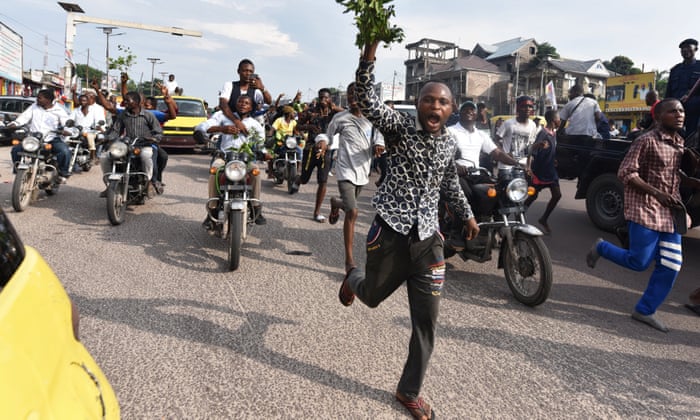DRC election: opposition cries foul over long queues at polling stations
Election passes off mostly peacefully, but many Congolese still queuing at poll-closing time Supporters of Felix Tshisekedi celebrate after he cast his ballot at a polling station in Kinshasa. Photograph: Olivia Acland/Reuters
Supporters of Felix Tshisekedi celebrate after he cast his ballot at a polling station in Kinshasa. Photograph: Olivia Acland/Reuters Jason Burke-
Jason Burke-Opposition leaders in the Democratic Republic of Congo have accused electoral authorities of deliberately blocking people from casting their ballots in an election on Sunday marred by widespread logistical problems.
Observers hope that the election, which passed off mostly peacefully, will bring about the vast central African country’s first ostensibly democratic transition of power in its troubled history and chart a road to a better future. Others fear renewed instability if the opposition rejects the results and calls for protests.
The presidential election is the DRC’s third since the end of a civil war in 2002 that killed about 5 million people.
The election, already delayed by two years, was postponed from last Sundayto allow further time to overcome logistic challenges in a country of 80 million inhabitants spread over an area the size of western Europe with almost no metalled roads.
'Nothing works': floods and broken voting machines mar Congolese elections – video
After voting at 8am in the wealthy neighbourhood of Gombe, close to the presidential residence, a relaxed Joseph Kabila, the president since 2001, described the election as “free and credible”.
Kabila’s second electoral mandate expired in 2016 and the 47-year-old only reluctantly called new elections under pressure from regional powers. He was barred from standing again himself by the constitution and, critics claim, hopes now to rule through the handpicked government candidate, Emmanuel Ramazani Shadary.
Shadary, a hardline interior minister under EU sanctions for his role in a bloody crackdown on pro-democracy activists last year, called for peace after casting his ballot and said he expected to be president “from [Sunday] evening”.
Martin Fayulu, the leading opposition candidate, said: “Today, we are writing the end of Kabila, the end of misery for Congolese people.” Respected for his courage and principles, Fayulu had a limited profile and a small support base before the campaign.
“I will vote for Martin Fayulu,” said Mama Wivine, 40 and unemployed, as she waited for the machine to arrive at her polling place in Kinshasa’s Camp Luka neighbourhood. “We hope he can bring jobs and better conditions for us Congolese. We are fed up with the regime of Kabila.”
Félix Tshisekedi, another opposition candidate, said that some polling stations in Kinshasa had not even opened six hours after voting began. He accused the government of deliberately creating an election day mess to block voters and spark a court challenge that will allow Kabila to extend his time in power. “I deplore all the disorder that we hear about,” said Tshisekedi, who said Kabila’s government is “responsible for this mess”.
Tshisekedi’s supporters went further, claiming the delays were a deliberate attempt to diminish the opposition vote.
The DRC has refused international offers of help to conduct the elections, stating that this would “compromise its sovereignty”. An untold number of Congolese remained in queues at poll-closing time, and by law would be able to vote.
The church, an influential institution in a devout nation, deployed more than 40,000 observers, who found that the vote had not started on time at 830 polling stations, about a fifth of the stations across the country. It also said 846 stations were installed in “prohibited places” such as military camps, police posts or private residences. By noon, observers had reported more than 500 problems with voting machines.
There were widespread reports that controversial electronic voting machines – never used before for an election on this scale – were either breaking down, running low on power, or causing significant delays as voters struggled to follow instructions.
Huge queues formed outside polling stations in Limete, an opposition stronghold in Kinshasa, where voting had not started by mid-afternoon. There were also reports that Fayulu’s name was not on the ballot in some locations.
Activists in the southern city of Mbuji-Mayi told the Guardian the day had been calm apart from an incident of suspected rigging in favour of government candidates.
In Lubumbashi, an opposition stronghold in the southeast, and the eastern border city of Goma, activists said many voters spent the day searching for their names on voter lists without success. Elsewhere, observers were blocked from polling stations.
There were no votes cast at all in three opposition strongholds in the east of the country after the authorities cancelled the vote there, citing health risks from an Ebola outbreak and ethnic violence. The postponement prompted violent protests last week.
Residents in Beni said they should have the right to have their votes counted. “We do not have Ebola. Kabila is worse than Ebola,” Jacob Salamu, 24, said.
The DRC’s fragmented opposition has been unable to field one unified candidate, effectively splitting the vote of those who want to see significant change in the DRC.
Voting was mostly peaceful across the country, but there were a few violent incidents. A police officer and civilian were killed the east in a dispute over alleged voting fraud, a local politician who witnessed the incident told Reuters.
In the central city of Kananga, the head of a polling station was beaten up by voters who suspected him of trying to cheat when he moved a broken-down voting machine from the room, two local activists said. In Masisi territory, militia fighters were also reported around polling sites, pressuring people to vote for their preferred candidates.
